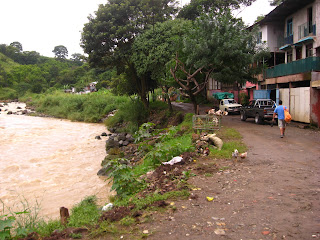Rains rip through region
Posted: Friday, October 21, 2011 - By Adam Williams
Update: Storms claimed at least 105 lives thoughout Central America. Will rains let up next week?
Alberto Font
A truck carefully passes a damaged road in Quitirrisí de Mora, southwest of San José. Heavy rains soaked the region this week, causing landslides and damaging 1,600 kilometers of roads across the country. Five people were killed in Costa Rica. Several roads were closed, including two sections of the Inter-American Highway.
The wrath of Mother Nature ripped through Central America this week, as torrential rains, landslides and flooding killed at least 105 people.
El Salvador and Guatemala were the hardest hit, while Nicaragua, Honduras and Costa Rica suffered extensive damage to homes, roads and crops.
In El Salvador, 32 people were reported dead and two were missing on Wednesday. Officials closed schools and relocated nearly 49,000 people to shelters throughout the country.
Guatemala reported 35 deaths. President Álvaro Colom said on Wednesday that rains had affected more than 500,000 residents and caused several million dollars in damages to crops and infrastructure.
The Red Cross of Costa Rica reported that five people drowned in different regions of the country. All five were killed by rising rivers.
By Tuesday, government leaders in Guatemala, El Salvador, Nicaragua and Honduras had declared national states of emergency.
On Wednesday, the National Emergency Commission (CNE) reported that more than 1,000 Costa Ricans were moved to temporary shelters. Most of the evacuees were located in the northwestern province of Guanacaste, which has been battered by rains.
According to Ghassem Asrar, director of the World Climate Research Program, Central America was in the midst of an “extreme event.”
“In terms of the magnitude of the impact, the duration and the amount of devastation that has occurred, including landslides and the loss of lives, we consider this to be an extreme event,” he said this week at a
press conference in Denver, Colorado, in the United States.
Regional meteorologists reported that as much as 120 centimeters (47 inches) of rain accumulated in the past
week in some areas – three times the monthly average for the season. More than 700,000 people in Central America have been displaced by weather-related events so far in October.
Aid from around the world poured in this week from Taiwan, Spain, the U.S., Venezuela and a host of other countries. Taiwan donated $200,000 to Honduras, while the U.S., Taiwan, World Bank and Central American Bank of Economic Integration pledged funds to assist El Salvador.
Many Costa Rican roads were devastated by rains and flooding. The Caldera Highway, which connects San José to the Pacific port of Caldera, was closed and reopened several times throughout the week because of a mudslide between the Central Valley town of Atenas and Orotina, near the Pacific coast.
The 11-kilometer stretch of road between the two towns has been wrought with construction flaws since the highway’s inauguration in January 2009. This week, the road was closed and reopened repeatedly on Monday, on Tuesday and again on Wednesday.
“The landslides started Friday, and then again Tuesday night,” said Álvaro Carvajal, an employee of Alquileres Valverde who has been working on highway repairs since last Friday. “The cement can’t sustain the earth. Thank God no one has been killed. A huge rock fell last year in this same area and killed a man on a motorcycle.”
“The highway collapsed because the field next to the highway was full of water. The land became almost gelatinous and collapsed,” said David Meléndez, emergency director for the Public Works and Transport Ministry (MOPT). “It is going to require a great deal of work to repair.”
MOPT reported that rains damaged 1,600 kilometers of roads this week. By Thursday morning, the National Roadway Council had reported that 25 roads were closed and 85 were damaged.
Harsh rains also damaged crops. Erick Quirós, director of regional operations for the Agriculture Ministry, said that the northwestern Guanacaste province was the most affected region, and that fields of sugar cane and rice were entirely underwater. Quirós said that more than 20,000 hectares of land were flooded throughout the country, and that more than 4,300 hectares of sugar cane and 3,200 hectares of rice suffered damages.
Quirós said farmers were evacuating animals from the region, and that rains could cause “ojo de gallo,” a damaging fungus disease, on coffee plants in the north-central towns of Monteverde, Miramar and Cedral.
Uncharacteristically low temperatures accompanied constant rains. Throughout the week, temperatures hovered at 15 degrees Celsius (59 degrees Fahrenheit), forcing residents to bundle up in jackets and scarves. The cold front was felt throughout the region, as Central American countries to the north also experienced unseasonably cool temperatures.
According to Eladio Solano, a meteorologist at the National Meteorology Institute, the explanation for the cold is simple: With constant rains and overcast skies, the sun hasn’t been able to warm the isthmus.
“The sun really hasn’t penetrated the clouds much in the past week,” Solano told The Tico Times. “Without any rays of sun coming through the clouds, air pressure has remained low and the temperature has remained much colder than usual.”
As for an upcoming forecast, Solano said that a respite from incessant downpour is expected, but that October rains are expected to continue.
“October is traditionally the rainiest month of the winter season,” Solano said. “Rains have been strong to start the month but they are not extraordinarily abnormal. Lots of rain is always expected in October.”
Ellen Weathers and AFP contributed to this story.
El Salvador and Guatemala were the hardest hit, while Nicaragua, Honduras and Costa Rica suffered extensive damage to homes, roads and crops.
In El Salvador, 32 people were reported dead and two were missing on Wednesday. Officials closed schools and relocated nearly 49,000 people to shelters throughout the country.
Guatemala reported 35 deaths. President Álvaro Colom said on Wednesday that rains had affected more than 500,000 residents and caused several million dollars in damages to crops and infrastructure.
The Red Cross of Costa Rica reported that five people drowned in different regions of the country. All five were killed by rising rivers.
By Tuesday, government leaders in Guatemala, El Salvador, Nicaragua and Honduras had declared national states of emergency.
On Wednesday, the National Emergency Commission (CNE) reported that more than 1,000 Costa Ricans were moved to temporary shelters. Most of the evacuees were located in the northwestern province of Guanacaste, which has been battered by rains.
According to Ghassem Asrar, director of the World Climate Research Program, Central America was in the midst of an “extreme event.”
“In terms of the magnitude of the impact, the duration and the amount of devastation that has occurred, including landslides and the loss of lives, we consider this to be an extreme event,” he said this week at a
press conference in Denver, Colorado, in the United States.
Regional meteorologists reported that as much as 120 centimeters (47 inches) of rain accumulated in the past
week in some areas – three times the monthly average for the season. More than 700,000 people in Central America have been displaced by weather-related events so far in October.
Aid from around the world poured in this week from Taiwan, Spain, the U.S., Venezuela and a host of other countries. Taiwan donated $200,000 to Honduras, while the U.S., Taiwan, World Bank and Central American Bank of Economic Integration pledged funds to assist El Salvador.
Many Costa Rican roads were devastated by rains and flooding. The Caldera Highway, which connects San José to the Pacific port of Caldera, was closed and reopened several times throughout the week because of a mudslide between the Central Valley town of Atenas and Orotina, near the Pacific coast.
The 11-kilometer stretch of road between the two towns has been wrought with construction flaws since the highway’s inauguration in January 2009. This week, the road was closed and reopened repeatedly on Monday, on Tuesday and again on Wednesday.
“The landslides started Friday, and then again Tuesday night,” said Álvaro Carvajal, an employee of Alquileres Valverde who has been working on highway repairs since last Friday. “The cement can’t sustain the earth. Thank God no one has been killed. A huge rock fell last year in this same area and killed a man on a motorcycle.”
Perhaps the biggest road collapse of the week occurred on a section of the Inter-American Highway, which runs from the northern border with Nicaragua to the Panama border to the south. On kilometer 39, in the section of highway known as Casa Mata, a large chunk of road collapsed Tuesday night. A car traveling on the highway tumbled down a large dirt embankment during the landslide, though the driver and passengers suffered only minor injuries.
“The highway collapsed because the field next to the highway was full of water. The land became almost gelatinous and collapsed,” said David Meléndez, emergency director for the Public Works and Transport Ministry (MOPT). “It is going to require a great deal of work to repair.”
MOPT reported that rains damaged 1,600 kilometers of roads this week. By Thursday morning, the National Roadway Council had reported that 25 roads were closed and 85 were damaged.
Harsh rains also damaged crops. Erick Quirós, director of regional operations for the Agriculture Ministry, said that the northwestern Guanacaste province was the most affected region, and that fields of sugar cane and rice were entirely underwater. Quirós said that more than 20,000 hectares of land were flooded throughout the country, and that more than 4,300 hectares of sugar cane and 3,200 hectares of rice suffered damages.
Quirós said farmers were evacuating animals from the region, and that rains could cause “ojo de gallo,” a damaging fungus disease, on coffee plants in the north-central towns of Monteverde, Miramar and Cedral.
Uncharacteristically low temperatures accompanied constant rains. Throughout the week, temperatures hovered at 15 degrees Celsius (59 degrees Fahrenheit), forcing residents to bundle up in jackets and scarves. The cold front was felt throughout the region, as Central American countries to the north also experienced unseasonably cool temperatures.
According to Eladio Solano, a meteorologist at the National Meteorology Institute, the explanation for the cold is simple: With constant rains and overcast skies, the sun hasn’t been able to warm the isthmus.
“The sun really hasn’t penetrated the clouds much in the past week,” Solano told The Tico Times. “Without any rays of sun coming through the clouds, air pressure has remained low and the temperature has remained much colder than usual.”
As for an upcoming forecast, Solano said that a respite from incessant downpour is expected, but that October rains are expected to continue.
“October is traditionally the rainiest month of the winter season,” Solano said. “Rains have been strong to start the month but they are not extraordinarily abnormal. Lots of rain is always expected in October.”
Ellen Weathers and AFP contributed to this story.
Please pray for Central America
as these storms continue in the area.


















































